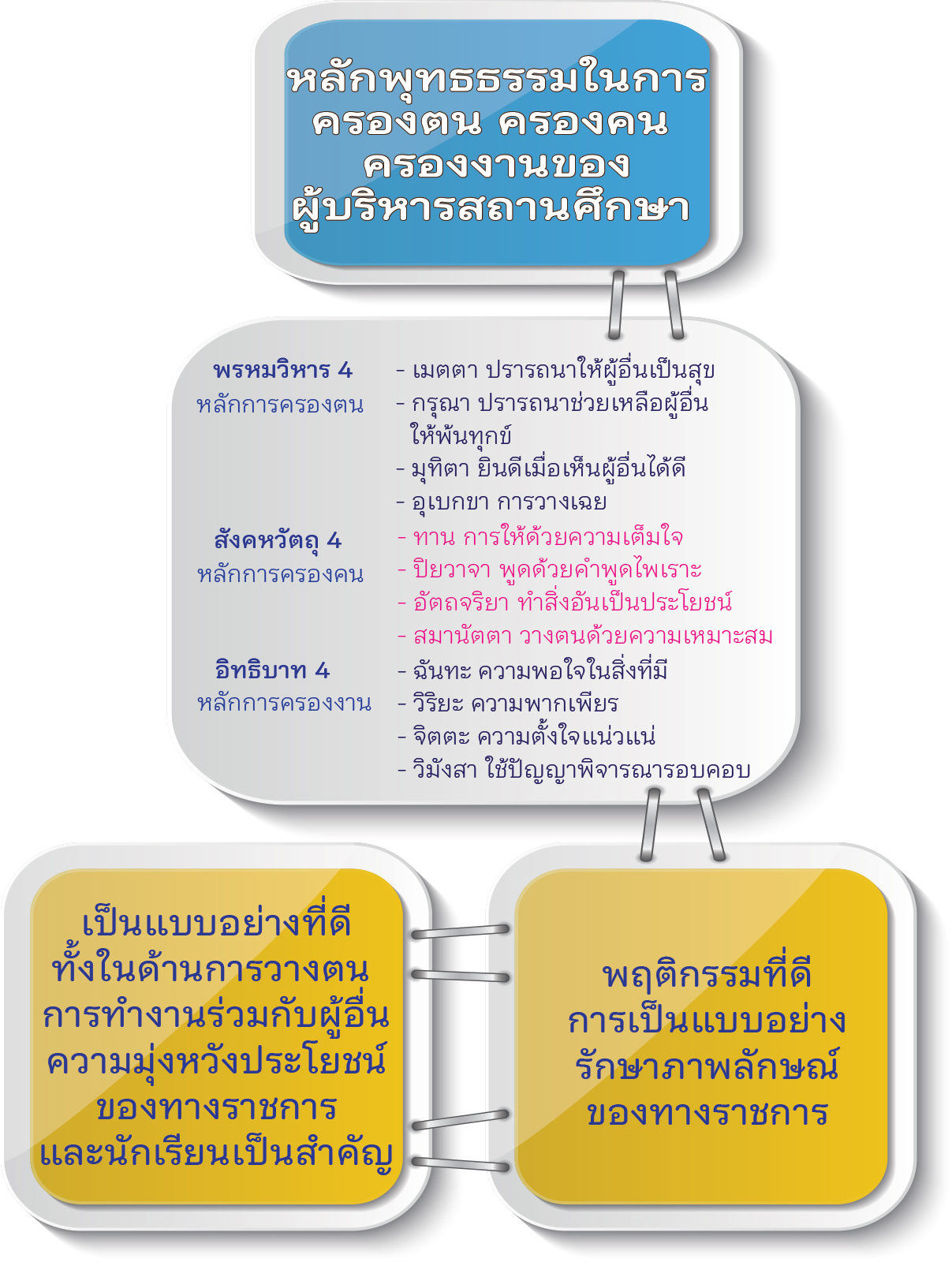Buddhist Principles Application in Self-Control, Man Control, and Work Control of School Administrators under the Jurisdiction Chiangmai Primary Educational Service Area Office 6
Main Article Content
Abstract
The purposes of this research were 1) study the application of Buddhist principles in governing oneself, governing people, and governing the work of educational institution administrators under the jurisdiction of the Chiang Mai Primary Educational Service Area Office Area 6, 2) Develop guidelines for applying Buddhist principles in governing oneself, one's people, one's work for educational institution administrators under the jurisdiction of the Chiang Mai Primary Educational Service Area Office Area 6, the instrument used in the research was a questionnaire. Data were collected from a sample group consisting of 79 school administrators and 256 teachers, totaling 335 people. Quantitative data were analyzed using the SPSS program to analyze frequencies, percentages, means and standard deviations.
The results revealed that:
1. Results of the analysis of the application of Buddhist principles in governing oneself, man control, and governing the work of School administrators under the jurisdiction of the Chiang Mai Primary Educational Service Area Office, Area 6, the overall level is at a high level. When considering each aspect according to the principles of Buddhism, it was found that every item was at a high level, arranged from highest to lowest average as follows: Self-control in terms of holding people employment aspect.
2. Guidelines for applying the principles of Buddhism in governing oneself, man control, and governing work for school administrators under the jurisdiction of the Chiang Mai Primary Educational Service Area Office, Area 6, it was found that; 1) self-care Apply the Four sublime states of mind, consisting of loving-kindness, compassion, sympathetic joy, and equanimity having good intentions. Listen to opinions support personnel to progress be fair and maintain correctness and being neutral, 2) residence of people use the base of sympathy, consisting of giving offering, kindly speech, useful conduct, and even and equal treatment namely building morale for personnel use of rhetoric, empathy, justice, 3) job management use the Four Foundations for accomplishment consist, consisting of passion, diligence, mind or consciousness, and investigation, happy at work and satisfaction of job, dedicated and hardworking person devote and participation of job.
Article Details

This work is licensed under a Creative Commons Attribution-NonCommercial-NoDerivatives 4.0 International License.
เพื่อให้เป็นไปตามกฎหมายลิขสิทธิ์ ผู้นิพนธ์ทุกท่านต้องลงลายมือชื่อในแบบฟอร์มใบมอบลิขสิทธิ์บทความ ให้แก่วารสารฯ พร้อมกับบทความต้นฉบับที่ได้แก้ไขครั้งสุดท้าย นอกจากนี้ ผู้นิพนธ์ทุกท่านต้องยืนยันว่าบทความ ต้นฉบับที่ส่งมาตีพิมพ์นั้น ได้ส่งมาตีพิมพ์เฉพาะในวารสาร วิชาการธรรม ทรรศน์ เพียงแห่งเดียวเท่านั้น หากมีการใช้ ภาพหรือตารางของผู้นิพนธ์อื่นที่ปรากฏในสิ่งตีพิมพ์อื่นมาแล้ว ผู้นิพนธ์ต้องขออนุญาตเจ้าของลิขสิทธิ์ก่อน พร้อมทั้ง แสดงหนังสือที่ได้รับการยินยอมต่อบรรณาธิการ ก่อนที่บทความจะได้รับการตีพิมพ์References
บุญมี วิทยาสิทธิ์. (2560). การประยุกต์หลักอิทธิบาท 4 ในการบริหารสถานศึกษาขั้นพื้นฐานสังกัดสำนักงานเขตพื้นที่การศึกษามัธยมศึกษา เขต 25. (วิทยานิพนธ์พุทธศาสตรมหาบัณฑิต). พระนครศรีอยุธยา: มหาวิทยาลัยมหาจุฬาลงกรณราชวิทยาลัย.
พระใบฎีกานพดล ธีรปญฺโญ. (2564). การประยุกต์หลักพุทธธรรมในการพัฒนาชุมชนวิถีพุทธตามโครงการหมู่บ้านบวร อำเภอศรีสัชนาลัย จังหวัดสุโขทัย. วารสารธรรมวิชญ์, 3(1), 193-205.
พระธนิษฐ์ ศรีสมบัติ, จิราภรณ์ ผันสว่าง และสุเทพ เมยไธสง. (2566). การประยุกต์ใช้หลักพุทธธรรมในการครองตน ครองคน และครองงานของบุคลากรในสถานศึกษา สังกัดสํานักงานเขตพื้นที่การศึกษาประถมศึกษาร้อยเอ็ด เขต 1. วารสารพุทธปรัชญาวิวัฒน์, 7(1), 1-11.
พระนิรันดร์ จรณธมฺโม. (2560). การบริหารโรงเรียนพระปริยัติธรรม แผนกสามัญศึกษาตามหลักพรหมวิหารธรรม 4 สังกัดสำนักงานพระพุทธศาสนาแห่งชาติ จังหวัดขอนแก่น. (วิทยานิพนธ์พุทธศาสตรมหาบัณฑิต). พระนครศรีอยุธยา: มหาวิทยาลัยมหาจุฬาลงกรณราชวิทยาลัย.
พระมหาสันติ ธีรภทฺโท (นาถาบำรุง). (2562). การประยุกต์ใช้หลักพุทธธรรมในการบริหารงานภาครัฐ เพื่อความปรองดองในสังคมไทย. วารสารบัณฑิตศึกษาปริทรรศน์, 15(3), 99-112.
พายุภู คำวงษ์. (2560). การปรับใช้หลักพุทธจริยธรรมเพื่อพัฒนาผู้บริหารสถานศึกษาขนาดเล็กให้การทำงานมีประสิทธิภาพ. วารสารมนุษยศาสตร์และสังคมศาสตร์ มหาวิทยาลัยราชภัฏอุบลราชธานี, 8(2), 148-159.
วิเชียร บุญกล้า. (2560). การใช้หลักพรหมวิหารธรรม 4 ของผู้บริหารสถานศึกษาในสถานศึกษาขั้นพื้นฐาน สังกัดสำนักงานเขตพื้นที่การศึกษาสุรินทร์ เขต 3. (วิทยานิพนธ์ครุศาสตรมหาบัณฑิต). เลย: มหาวิทยาลัยราชภัฎเลย.
Burmansah, B., et al. (2020). Mindful Leadership: The Ability of the Leader to Develop Compassion and Attention without Judgment - A Case Study of the Leader of Buddhist Higher Education Institute. European Journal of Education Research, 9(1), 51-65.

